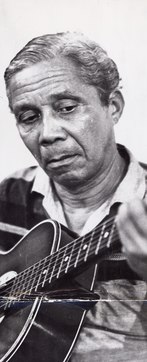This is an old revision of this page, as edited by Citation bot (talk | contribs) at 18:54, 22 February 2023 (Alter: url, pages. URLs might have been anonymized. Formatted dashes. | Use this bot. Report bugs. | Suggested by AManWithNoPlan | #UCB_CommandLine). The present address (URL) is a permanent link to this revision, which may differ significantly from the current revision.
Revision as of 18:54, 22 February 2023 by Citation bot (talk | contribs) (Alter: url, pages. URLs might have been anonymized. Formatted dashes. | Use this bot. Report bugs. | Suggested by AManWithNoPlan | #UCB_CommandLine)(diff) ← Previous revision | Latest revision (diff) | Newer revision → (diff) Composer and singer of samba
Nelson Cavaquinho (October 29, 1911 – February 18, 1986, birth name Nelson Antônio da Silva) was one of the most important singer/composers of samba. He is usually seen as a representative of the tragic aspects of samba thematics, with many songs about death and hopelessness. He was a prominent figure of samba school Estação Primeira de Mangueira.
Biography
Nelson was born in Rio de Janeiro. Coming from a poor family, he quit school at a young age to seek employment in a factory. He showed a musical talent at a young age playing a home-made guitar made of a cigar box and wires. When he could, he would borrow a cavaquinho and try and copy the techniques of professional cavaquinho players. He demonstrated a great ability to play the instrument and composed a choro ("Caminhando") which gained him notoriety as a musician (due in part to an uncommon modulation which made it hard for other instrumentalists to harmonize it). He was finally given a cavaquinho and having demonstrated a unique playing style on the instrument was given the nickname "Nelson Cavaquinho". He demonstrated a unique style of playing with only two fingers.
As a young man he became acquainted with famous samba players like Cartola, Carlos Cachaça, and Zé da Zilda. He went on to compose over 600 compositions. His main partner was Guilherme de Brito. Some of his better known works are: "A Flor e o Espinho", "Folhas Secas", "O Bem e o Mal" and "Juízo Final".
He died of emphysema on February 18, 1986, at the age of 74, in Rio de Janeiro.
References
- Machado, Roberto Pinheiro (2018-06-11). Brazilian History: Culture, Society, Politics 1500-2010. Cambridge Scholars Publishing. pp. 222–224. ISBN 978-1-5275-1209-2.
- Hertzman, Marc A. (2016-05-01). "Toward and against a Sounded History". Hispanic American Historical Review. 96 (2): 249–258. doi:10.1215/00182168-3484126. ISSN 0018-2168.
External links
This article on a Brazilian musician is a stub. You can help Misplaced Pages by expanding it. |